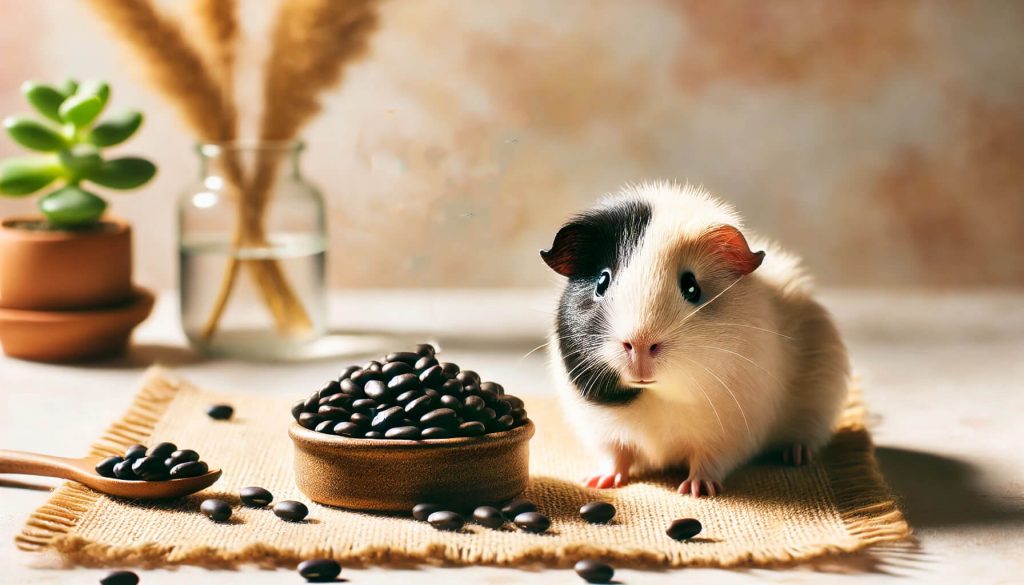
Can Guinea Pigs Eat Black Beans?
Nutritional Analysis of Black Beans
Black beans offer various nutrients that might seem beneficial, yet it’s essential to analyze their suitability for guinea pigs.
Vitamins and Minerals Content
Black beans contain several vitamins and minerals. They include:
- Vitamin A: Supports vision and immune function.
- Vitamin C: Essential for guinea pigs; prevents scurvy.
- Iron: Crucial for blood production.
- Magnesium: Supports muscle and nerve function.
However, the amount of these nutrients may not align with a guinea pig’s dietary needs.
Protein and Fiber in Black Beans
Black beans are rich in protein and fiber:
- Protein: Approximately 21g per 100g. Though beneficial for humans, excess protein can stress a guinea pig’s kidneys.
- Fiber: Roughly 15g per 100g. While fiber aids digestion, the high content might cause digestive issues in guinea pigs.
Assess these factors before deciding to introduce black beans to your guinea pig’s diet.
Risks of Feeding Black Beans to Guinea Pigs
Black beans pose specific risks to guinea pigs due to their unique dietary requirements.
Digestive Issues and Toxicity
Guinea pigs have sensitive digestive systems. Black beans contain high levels of protein and fiber, 21g and 15g per 100g respectively, which can disrupt their digestive balance. Excess fiber can cause bloating, gas, and diarrhea, stressing your pet’s digestive tract. Undercooked or raw black beans contain lectins, which are toxic to guinea pigs and can lead to severe stomach distress. Cooked beans reduce lectin content but still risk digestive issues due to other nutritional imbalances.
Potential Allergic Reactions
Black beans present a risk of allergic reactions. Symptoms include itching, swelling, and respiratory issues. Immediate veterinary attention is necessary if your guinea pig exhibits these signs after consuming beans. Guinea pigs, being more sensitive than other pets, might show severe allergic responses even to small quantities. Always introduce any new food slowly and observe for any adverse reactions to better ensure your pet’s safety.
Safe Alternatives to Black Beans for Guinea Pigs
To keep your guinea pigs healthy, avoid feeding them black beans. Instead, opt for safer alternatives that suit their dietary needs.
Recommended Vegetables and Fruits
Guinea pigs thrive on a variety of fresh vegetables and fruits. Include these in their diet:
- Bell Peppers: Low in calories and high in vitamins A and C.
- Carrots: Good source of beta-carotene, provide in moderation.
- Cucumbers: Hydrating snack that’s gentle on their stomach.
- Romaine Lettuce: Contains essential nutrients and promotes digestion.
- Kale: Rich in vitamins K, C, and calcium; feed occasionally.
Include fruits like:
- Apples: High in fiber, offer in small wedges without seeds.
- Blueberries: Powerful antioxidants; serve as occasional treats.
- Strawberries: Rich in vitamin C; give in moderation.
- Oranges: Boosts vitamin C, peel beforehand and limit quantity.
Foods to Avoid
Certain foods can harm guinea pigs and disrupt their health:
- Black Beans: High protein and fiber cause digestive issues.
- Potatoes: Contain toxic solanine, unsafe for consumption.
- Onions and Garlic: Lead to digestive upset and toxicity.
- Chocolate: Contains theobromine, toxic to guinea pigs.
- Dairy Products: Guinea pigs lack the enzymes to digest them.
- Nuts and Seeds: High-fat content can lead to obesity.
Avoiding these foods ensures your guinea pigs stay healthy and happy. Prioritize their health by choosing appropriate alternatives and regularly consulting your vet for advice.
How to Introduce New Foods to Guinea Pigs
Introducing new foods to guinea pigs requires careful consideration and patience. Follow these steps to ensure your pet’s health and well-being.
Steps for Safe Introduction
- Start Slow: When introducing new foods like vegetables or fruits, add small amounts to your guinea pig’s diet. Initially offer a tiny piece to gauge their reaction.
- Observe Response: Watch for any adverse reactions such as diarrhea or reluctance to eat. Negative effects warrant discontinuing the new food immediately.
- Gradual Increase: If your guinea pig tolerates the new food well, gradually increase the portion over several days. Mix it with their regular diet to ease the transition.
- Variety and Balance: Ensure you offer a balanced diet that includes hay, guinea pig pellets, and various safe vegetables and fruits like bell peppers, carrots, and cucumbers.
- Check for Changes: Monitor your guinea pig for changes in eating habits or weight. Sudden shifts might indicate a reaction to new food.
- Weekly Weigh-Ins: Conduct weekly weigh-ins to track any weight fluctuations. Significant changes should prompt a vet consultation.
- Behavioral Signs: Keep an eye on your guinea pig’s behavior. Reduced activity, changes in droppings, or a lack of interest in food can signal digestive issues.
- Regular Vet Visits: Schedule regular visits to the vet. Professional guidance helps ensure your guinea pig’s diet supports their health and nutritional needs.
Conclusion
Feeding black beans to guinea pigs isn’t advisable due to their high protein and fiber content, which can lead to kidney stress and digestive issues. It’s crucial to introduce new foods gradually and monitor your guinea pig’s reactions closely. Always aim for a balanced diet and keep an eye out for any adverse effects. Regular weigh-ins and vet visits are essential for maintaining your pet’s health. Opt for safer alternatives like bell peppers, carrots, cucumbers, and apples while avoiding harmful foods such as potatoes, onions, chocolate, and dairy products. Prioritizing your guinea pig’s nutritional needs ensures their well-being and happiness.
